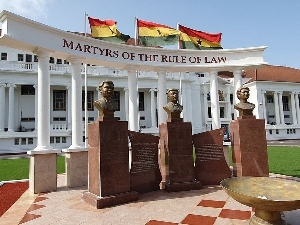Opinions of Wednesday, 2 August 2023
Columnist: Rodney Nkrumah-Boateng
My bittersweet Cape Coast weekend
I have always had a special place in my heart for Cape Coast (or Oguaa), which I insist is the gastronomical capital of this country.
The locals are perceived to be sweet-toothed and love to roast, panfry or grill their food to give it an exotic twist ― perhaps a carry-over from the early contact with Europeans.
But beyond that, they are famed for having the particular skill of delivering their Fantse with aromatic panache and seasoning it with a liberal sprinkling of English words ― what in linguistics is called ‘code mixing’.
Oguaa is one of my favourite weekend getaway destinations.
My love for this former administrative capital of the then Gold Coast until 1877, when Accra took over, is steeped in its rich, evocative sense of history and quaint charm, especially with its castle, many of its very old buildings and narrow lanes reminiscent of the pre-colonial and colonial eras.
Then of course there is the grandly-named, but grossly overhyped ‘London Bridge’.
I shall say no more about the bridge.
Special congregation
Over the weekend, work took me to Cape Coast, specifically to the University of Cape Coast, for a special congregation on Saturday to honour Dr. Matthew Opoku Prempeh, Energy Minister and MP for Manhyia South, and six others, with honorary doctorate degrees.
I arrived on Friday evening and decided to sample the night life as I always do whenever in town.
Shortly after midnight, after a few stops with a couple of old friends and a few drinks, I told myself I was no longer as young as I used to be for late-night pub crawling, so I hauled my weary bones to bed.
Not much happens in Cape Coast on Friday nights anyway.
The action takes place on Sunday nights.
The next day, after breakfast, my colleagues and I made our way to the New Examination Centre at the university.
In addition to Dr. Prempeh, who is also known as ‘Napo’, the other awardees were Ehunabobrim Prah Agyensaim VI, a lawyer and businessman who is also the Paramount Chief of the Assin Owirenkyi Traditional Area of the Central Region, Dr. K.K Sarpong, immediate past CEO of the GNPC and a philanthropist, Prof. Harold Stewart Amonoo-Koufi, a medical practitioner and Chairman of the Council of Cape Coast Technical University, Dr. Deborah Rose, researcher and philanthropist, Dr. Yaw Adu-Agyei Gyamfi, clinical pharmacist and CEO of Dampong Healthcare Group and Prof. Daniel A. Wubah, a biologist and President of Millersville University, Pennsylvania, USA.
Friends, family and colleagues of each of the awardees had travelled from out of town to support them.
Convocation was in full force, as were council members and other key officials, draped in their colourful robes and looking very gravely academic.
One of Ghana’s foremost art and classical musicians and organist, Dr Patrick Addaquaye, wooed the audience with some amazing pieces during the two interludes.
Napo’s award
Eventually, we got to the crux.
In turn, each of the seven awardees rose to have their full citations read to the gathering, before being called up to be robed and then presented with their scrolls and their certificates, to drum appellations.
In the case of Dr. Prempeh’s Doctor of Educational Leadership (DEL, Honoris Causa) award, his leadership in delivering the Free SHS programme, which saw enhanced access to SHS education, student population jump from 800,000 in 2016 to 1.2 million was the highlight.
Several other reforms pursued in his tenure as Education Minister also gave impetus to the award.
These included curriculum reforms for Kindergarten to Primary Six, as well as an aggressive push to mainstream Technical and Vocational Education and Training (TVET) through the development of a five-year TVET Strategic Plan, among others.
The citation referred to Dr. Prempeh’s role, whilst Education Minister, in an agreement between the Government of Ghana and UNESCO that established the University of Cape Coast’s Institute Educational Planning and Administration (IEPA) as a UNESCO Category II Centre of Excellence.
This was the culmination of a great deal of engagement and deliberations through his lobbying of the UNESCO Executive Board to facilitate a record-time approval.
The elevation of the institute highlighted the importance of the need for a centre of excellence such as IEPA to guide teacher training in this country.
The IEPA has since then been working assiduously towards its strategic goals, through capacity building workshops, collaborations with key stakeholders and training of school heads, among others.
Beyond the IEPA, Dr. Prempeh as Education Minister also lobbied and obtained an agreement in 2018 with UNESCO to host a UNESCO Centre of Excellence in mathematical and allied sciences under the auspices of the African Institute for Mathematical Sciences, Ghana (AIMS-GHANA) in Accra.
This was Dr. Prempeh’s third honorary doctorate award.
The University of Education Winneba (UEW) and the University of Professional Studies, Accra (UPSA) both awarded him honorary doctorate degrees in 2021 for his leadership in the education sector.
I joked with a colleague that with these three doctorate awards on top of his bachelor’s degree in Medicine from KNUST, he could now insist on being addressed as ‘Dr Dr Dr Dr’ Matthew Opoku Prempeh.
Soon, it was time to head back to Accra with beautiful memories of the day.
Tragedy
I have always held the view that a trip to Cape Coast without the purchase of Fantse kenkey, some crispy, deep-fried octopus and shrimps at Yamoransa Junction on the way back is a travesty.
The size of the kenkey relative to the layers of wrapping leaves is the subject of another article.
As we approached the old toll booth just before Moree junction, and seemingly without any reason, a bus right in front of our vehicle that was full of small children suddenly veered off the road, rammed through some rickety stalls on the side of the road and plunged violently into a ditch.
A young lady who was brandishing some kenkey and other wares and was approaching our vehicle jumped out of the way in fright, barely escaping being crushed.
I have never seen an accident unfold before my very eyes, and I was rattled, as was the driver of our vehicle.
Traffic had been slow, and we were barely doing 20km per hour so it was clearly not a case of over speeding.
Passing by the vehicle to find a safe place to park, we saw the driver slumped before the wheel, his head resting on the steering wheel, his windscreen cracked.
Thankfully, all the children were pulled out safely.
However, another lady vendor had been mowed down by the bus and was stuck underneath it, with one of its front wheels sitting on her left leg while her head was stuck in an awkward position.
She was barely breathing, and eventually she stopped breathing altogether and lay still.
It was distressing to watch helplessly.
The lady who had escaped death by the skin of her teeth was still in shock and could barely speak.
As word spread among the other vendors along the stretch, they came running, tearfully screaming her name - ‘Kwakyewaa!!’ We all speculated that the driver must have dozed off at the wheel.
Helpless, we bought our kenkey and continued our journey after our driver had recomposed himself.
In our muted conversations, we wondered at the fleeting nature of life itself, like a wispy cloud across the skies.
A woman told us she had exchanged hearty greetings with her just fifteen minutes earlier, and that she was sitting at her stall.
Now, she was gone, just like that and without warning.
I kept wondering whether the construction of short, reinforced concrete pillars on the edge of the roads where vendors congregate, especially along our major highways, cannot help prevent some of these tragedies, since moving them altogether is unlikely to work.
My otherwise pleasant weekend had been marred, and I still cannot get poor Kwakyewaa out of my mind.












